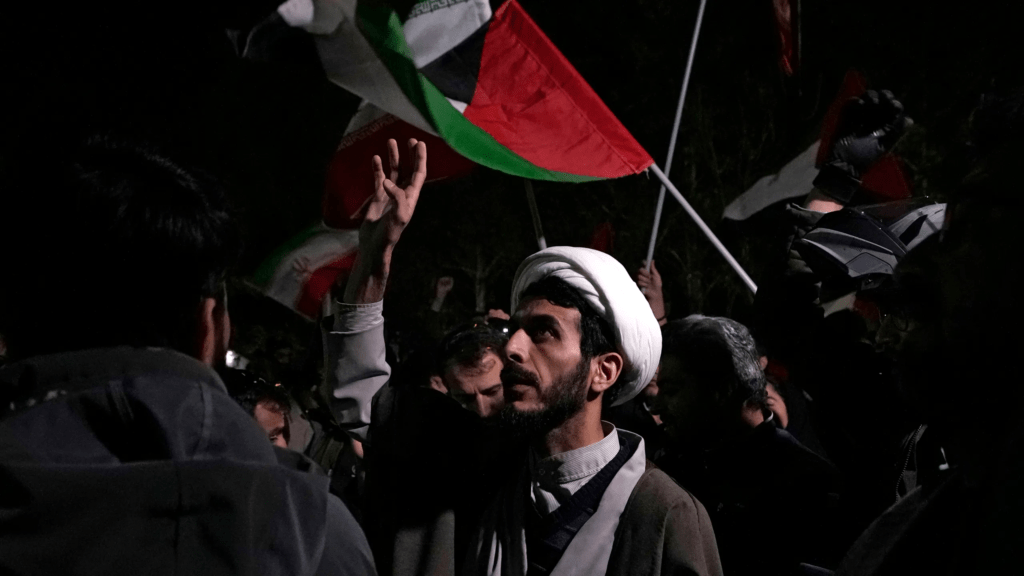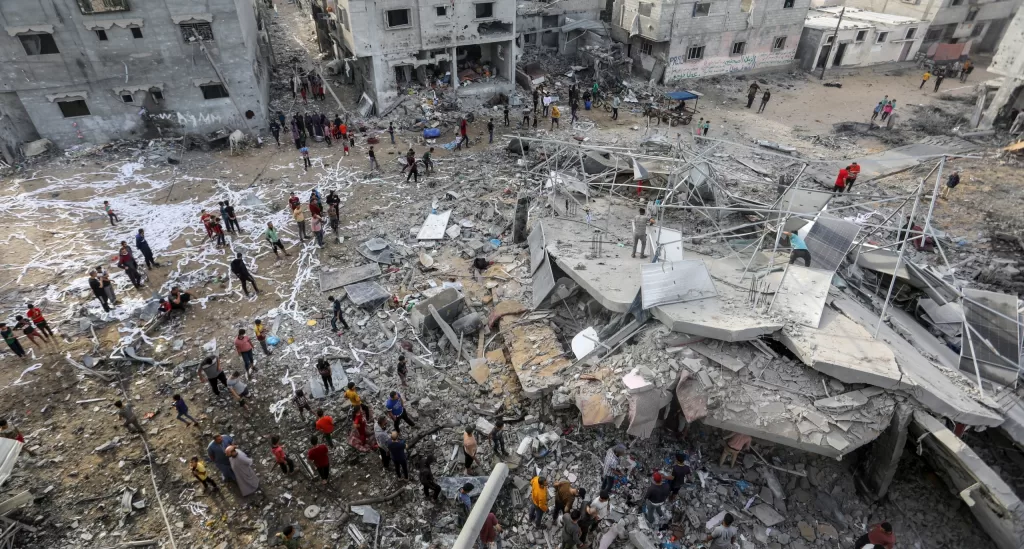Yaakov Amidror, a former National Security Advisor of Israel, while commenting on his country’s modus operandi to open several fronts with the Arabs had once said, “…each one is problematic; together, they are devastating.” Perhaps that is what the Zionist state is witnessing in the wake of its jingoism over Syria, persisting genocide against Gazans, and provoking the Iranians, et al. The Jewish state’s security, as of today, stands compromised and its myth of Iron Dome is literally decimated. Had it not been the political largesse of Washington, Tel Aviv would have been biting dust by now. Israel’s neighbours are no more scared of its might, though many are not in a position to stand tall and get noticed, as the Iranians have called the bluff by capitulating the Zion leadership in terms of artillery and diplomacy.
None but the ultra-right hawks in Israel are responsible for this decimation and must surely be regretting the folly of inviting ire from Tehran. The salvo of missiles and UAVs that Iran flew on April 14 has changed the strategic balance of the Middle East. It has led Israel into a faux pas situation, and its allies in Europe and across the Atlantic are wondering what’s next.
Iran has swung some real surprises but has not shown its lethal cards yet. By making use of its proxies in Yemen, Lebanon, Syria and Iraq to fire simultaneously on the Jewish territory with whatever they can to inflict damage, Tehran has muscle-flexed for the first time since its decade-long war with Baghdad in the region. Though many claim that the Iranian response was moderate, and could not bring Israel to its knees, it is not a realistic assessment, to say the least. The intention, perhaps, was to ring the sirens across Israel, and make it feel the heat of being attacked. By stage-managing the cruise and drones, precision-guided to military targets and especially the airbase from where Syria was bombed, Iran has kept the cool of the international audience. No civilian or public units were on Iran’s radar, and by coming up with a shut-up call by squaring the momentum, the Islamic Republic has successfully postponed the duel for another day!
This axis of resistance that Iran has purported will long be discussed in European and Arab capitals, and keep policymakers across the Atlantic on tenterhooks. Riyadh and Abu Dhabi are silent, and have hinted at staying out of the mess, if Americans tried for another misadventure in the region. This neutrality is, indeed, an achievement for Iran.

Istanbul is crisscrossed, and is finding itself in an awkward position as it still stands fast with Israel when it comes to bilateralism. Its window-dressing of rallying for Gaza and Palestine state is in thin air, and the same was snubbed at large by the Turks as they voted against President Tayyip Erdogan’s AKP party at the local tiers, casting a warning to his national leadership.
The Taliban in Kabul vowed to rally for Iran and praised its courage in attacking Israel. Thus, Iran has spilt the beans, and the political nomenclature inside Israel too is on the edgy terrain, and its inhabitants now confess that their God-promised homeland is no more a bed of roses. This political backlash will sooner than later be on the neck of the war-cabinet of Prime Minister Benjamin Netanyahu, who has already run out of options to stay put in power.
Iran’s resolve to stand up against Israel will soon be testing its resilience. That was categorically evident as there were reports of explosions in Isfahan carried out by Israel, and the US media was drum beating it as an attack on Iran. But the cool that Tehran exhibited by ignoring the home-originated drone attacks was a masterpiece in de-escalation.
Apparently, Iran is following a twopronged strategy of reading between the lines in the Machiavellian and Clausewitz doctrines, as it suits its national interests. At times, it borrows a leaf from Machiavelli who teaches rulers to blend a variety of virtues to keep and/or expand their territory, and this Iran has done by networking with its proxies: Hezbollah, Houthis, Shia or pro-Republic militants in Iraq and Syria.
This impact had bred sleepless nights in the Kingdoms and Sheikhdoms, and the United States stuck in an undesired war in the heartland of Europe, i.e. Ukraine, is seen pleading with Israel to mend its course of action and avoid escalation in the region.
Iran, likewise, documented a chapter from the Prussian military theorist, Carl von Clausewitz, as it convinced the world at large that it has the “moral and political” right of retaliating as per International Law, and it will do so at the time of its choosing. It did that in all suzerainty, and then sent down a shut-up call to Israel, calling it a square.
The mosaic of resistance has got an impetus since this piece of jingoism by Iran. It has led to jubilations on the streets of the Muslim world, once again exhibiting the divide between the State apparatus and the apolitical masses, who shun Israeli monopoly in the region and are eager for a peaceful and just international order.
On the stage of realpolitik, two instant responses were witnessed. The United States vetoed a resolution at the United Nations calling for full membership of the Palestinian State; and secondly, it slapped sanctions on four international firms, three Chinese and a Belarus, that supplies technologies in missile development programs.
The intention was primarily to screw Iran and Pakistan, and send down a message that the security of Israel is dear to the United States.
In an attempt to ward off embarrassment, Israel went trigger-happy and once again bombed the besieged enclave of Gaza. While it has not been able to showcase its might against Iran, it is contemplating to invade Gaza and the West Bank as a mark of consolation.
The war-cabinet of Netanyahu, apparently, is left with no choice and was seen calling in two reserve brigades for operational activities in Gaza. If that is so then the destined Armageddon is round the corner.
The showdowns in the month of April 2024 have proved that war in the Middle East is just a matter of time. The construed cool by Iran, and knee-jerk reactions on the part of Israel, are shortened episodes for domestic consumption, and the region longs for a long-term negotiated settlement.

It is unrealistic to keep the lid on fissures and genocide in Gaza and Palestine, and to continue occupying Golan Heights and swatches of Sinai by Israel. The Jewish state was never as vulnerable as it is today. Its refusal to trade land for peace and to go back to the 1967 borders is now costing its very existence.
Even countries that are eager for diplomatic relations with the Zionist state are now feeling the heat of carrying the moment.
Big-businesses and trans-regional development schemes involving Israel and its Arab neighbours, especially in water and energy projects, will soon stand marginalised and exhausted, if Tel Aviv never learns to sow the seeds of perpetual peace.
No geo-economics can come through in a state of war and revulsion. The earlier Israel learns it by behaving to act as a normal state, the better.
Iran, Saudi Arabia, Turkey, Qatar and the UAE have shown the way by addressing their bilateral, and collective, irritants and resolving to move on. Why can’t Israel do the same?
It has two simple things to do: accept the international order in Mideast and Persia by giving up expansionist designs; and carve out an independent State of Palestine by vacating occupied lands.
Serenity and security will then thrive on the region’s doorstep.





